Trail of destruction left by Israel’s night of rage: Hundreds of buildings in Gaza are turned to rubble by airstrike blitz with IDF troops still inside enclave in ‘rolling start’ to invasion as more tanks line up on border
Gazans who have refused to leave the north of the enclave despite Israeli warnings are living in a state of “panic, fear and chaos” amid the heaviest bombardment yet since October 7 and a total communications blackout.
Images began trickling out of the Palestinian occupied territory on Saturday as bombardments left civilians, journalists and aid organizations in limbo without electricity, internet or phone signal.
Israel has deployed ground troops and tanks in Gaza after bombing 150 ‘underground targets’ reportedly harboring Hamas terrorists in the region’s north; more and more vehicles and thousands of troops are gathering in Israeli border towns.
The country is beginning to allow humanitarian aid access to southern Gaza as the north is bombarded, amid claims it has killed two “spearhead” Hamas commanders, including an architect of the October 7 attacks that killed 1,400 Israelis.
However, there have been calls from observers for a ceasefire between Israel and Hamas as the Palestinian death toll rises above 7,700, according to Gaza’s Health Ministry; The toll is said to include more than 3,000 children.
Israel stepped up its air campaign on the northern parts of the enclave last night, claiming to have attacked around 150 “underground targets” harboring Hamas terrorists.
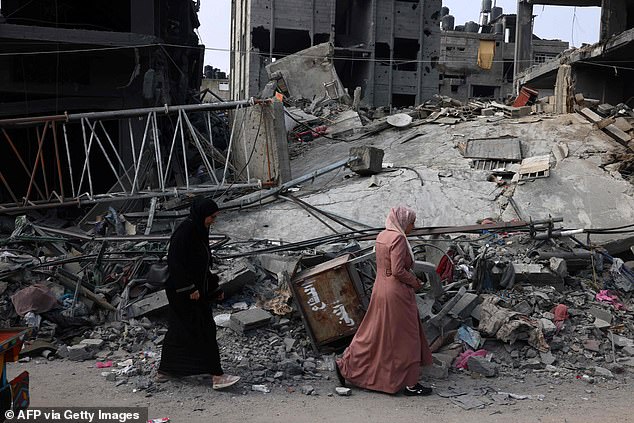
Women walk past a destroyed building in the southern Gaza city of Rafah on Saturday
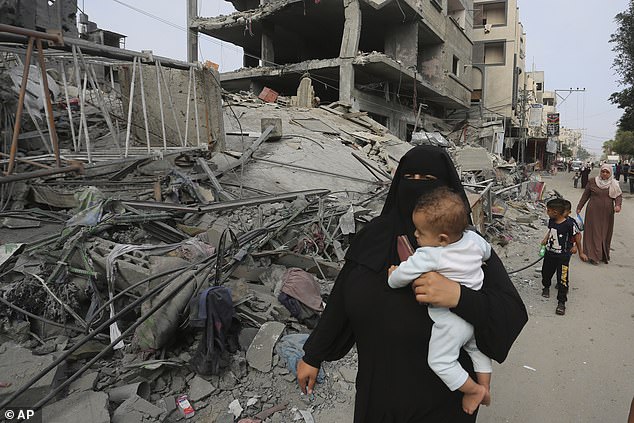
Families pass scenes of destruction in Gaza on Saturday morning after Israel carries out its most intense bombing campaign yet following the October 7 attacks
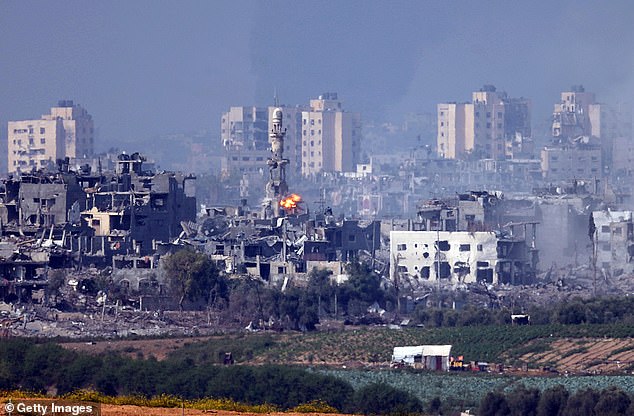
A rocket hits a minaret in Gaza on Saturday – as Israel’s deadly nighttime bombardment of the enclave continued into the day
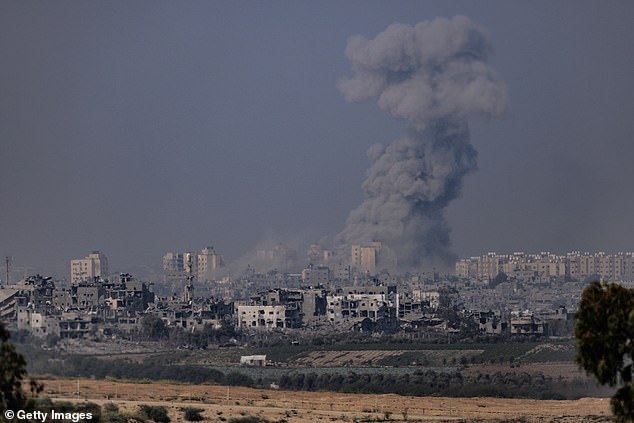
Smoke rises from an explosion in Gaza on Saturday. Israel says troops are still deployed and continuing their campaign
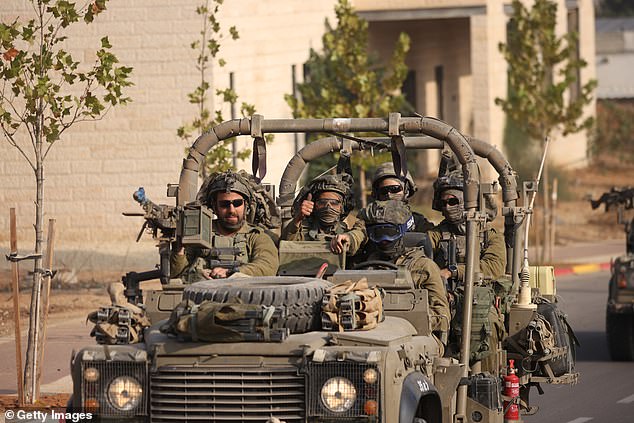
Israeli troops give a thumbs up to a photographer as they pass through the border town of Sderot, less than a kilometer from Gaza
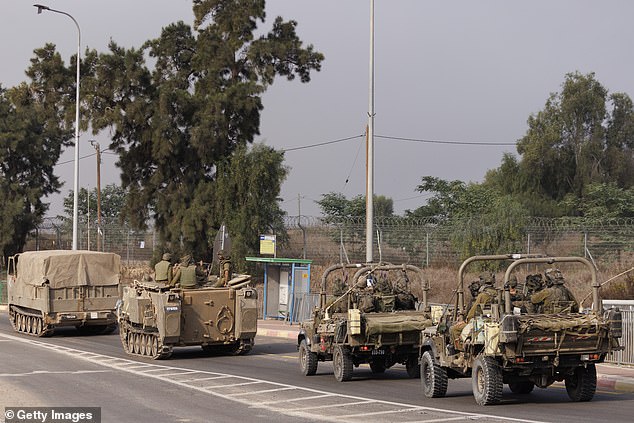
Israeli tanks and all-terrain vehicles continue to gather along the border after the Israeli Army (IDF) said it had sent troops and armor into Gaza
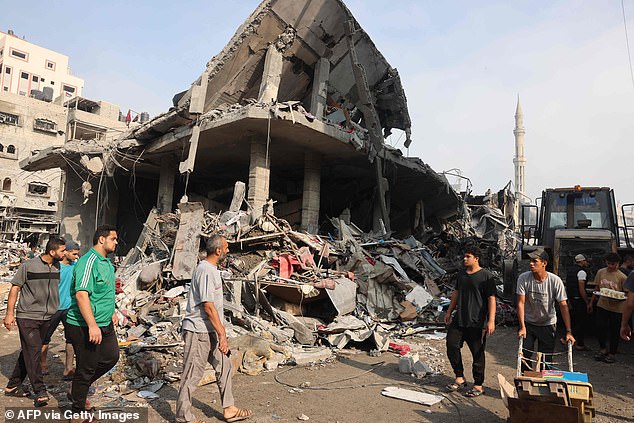
People gather in the streets of the Al-Shatee refugee camp in northern Gaza, which was heavily bombed by Israel overnight into Saturday
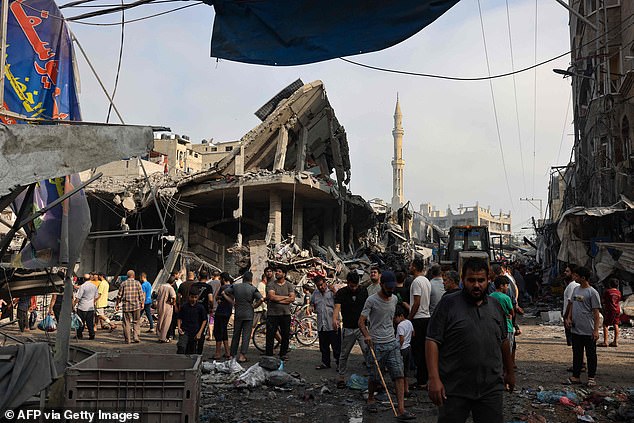
Palestinians examine destroyed buildings in Gaza City on Saturday. The Israeli Army (IDF) is sending ground troops and armored vehicles to the occupied territory
With the internet out, Palestinians in Gaza traveled on foot or by car to check on their relatives and friends after a night of airstrikes that some described as the most intense they had ever seen, even during previous Gaza wars.
BBC correspondent Rushi Abualouf, speaking from the southern city from Khan Younis, said: ‘We have had no communication here for the last ten hours because Israel cut the internet lines and fiber optic lines and also stopped the two main mobile providers so people could not communicate with each other.
“(It’s) a state of panic, fear and chaos; very chaotic scenes on the street. People don’t know what to do in these circumstances.’
“The bombs were everywhere, the building was shaking,” said Hind al-Khudary, a journalist in central Gaza and one of the few people with cellphone service.
‘We can’t reach or contact anyone. I don’t know where my family is.’
The UN agency for Palestinian refugees, which runs shelters and schools for nearly half of all displaced Gazans, has lost contact with most of its staff, spokeswoman Juliette Touma said on Saturday.
She said coordinating relief efforts is now “extremely challenging.”
Tedros Adhanom, head of the World Health Organization, said the power outage had made it impossible for ambulances to reach the injured.
“We are still not in contact with our staff and health facilities. I am concerned for their safety,” he wrote on X, formerly known as Twitter.
Elsewhere, Melanie Ward, chief executive of the charity Medical Aid for Palestinians, told BBC Radio 4’s Today program on Saturday that she had been unable to reach humanitarian workers operating in Gaza since 4pm on Friday.
She added: ‘Phones are not connecting, WhatsApp messages are not being delivered – we are very concerned for all our colleagues.’
Earlier on Saturday, Israel Defense Forces (IDF) spokesman Daniel Hagari said: “On the humanitarian aspect, to all Gazans who have moved south of the Gaza Stream, we are going to increase our humanitarian efforts.
“There will be more trucks coming in with food, medicine and water. Everyone in that area who is safe will receive water, medicine and food.”
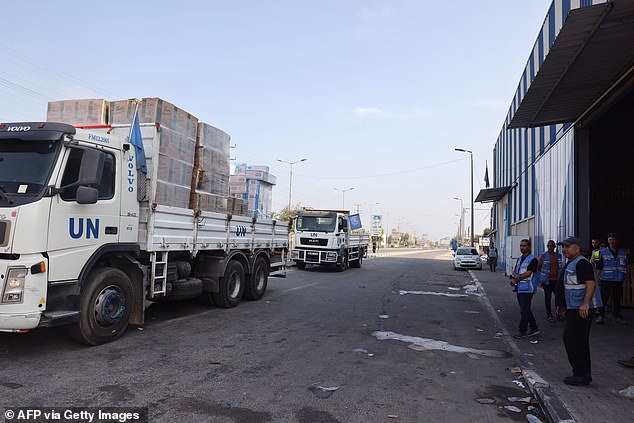
UN trucks carrying humanitarian aid arrive in the Palestinian city of Deir al-Balah; Israel had promised to allow aid organizations to enter through Egypt
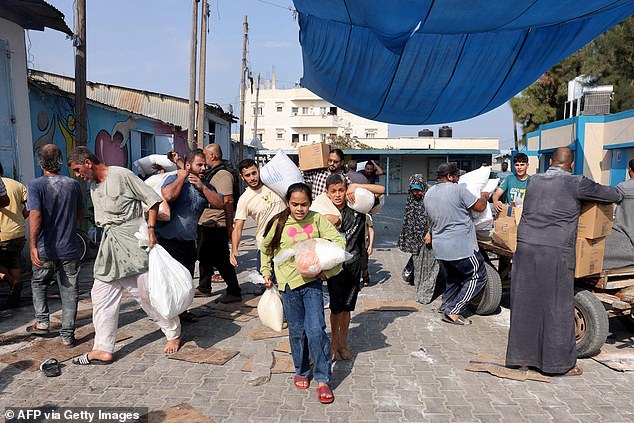
Palestinians transport food aid from a UN-run supply center
UN trucks carrying aid arrived in Gaza today; Images show people carrying basic food supplies.
Elsewhere, Melanie Ward, chief executive of the charity Medical Aid for Palestinians, told BBC Radio 4’s Today program on Saturday that she had been unable to reach humanitarian workers operating in Gaza since 4pm on Friday.
She added: ‘Phones are not connecting, WhatsApp messages are not being delivered – we are very concerned for all our colleagues.’
Palestinians in Gaza set out on foot or by car to check on their relatives and friends after a night of airstrikes described by some as the most intense they had ever seen, even during previous Gaza wars.
BBC correspondent Rushi Abualouf said from the southern town of Khan Younis: ‘We have had no communications here for the last ten hours as Israel cut internet lines and fiber optic lines and the two main mobile providers were also shut down, so people could no longer communicate. to communicate with each other.
“(It’s) a state of panic, fear and chaos; very chaotic scenes on the street. People don’t know what to do in these circumstances.’
“The bombs were everywhere, the building was shaking,” said Hind al-Khudary, a journalist in central Gaza and one of the few people with cellphone service.
‘We can’t reach or contact anyone. I don’t know where my family is.’
Israel has been criticized for continuing its bombing campaign while causing many civilian casualties.
The Health Ministry in Hamas-ruled Gaza said on Saturday that at least 7,703 people have been killed in the war with Israel that broke out on October 7.
More than 3,500 children were among the dead, the ministry added.
More than 1,400 people in Israel have been killed, mostly civilians, in the first Hamas attack.
In addition, 229 people, including foreigners, children and older adults, were taken by Hamas during the raid and remain in captivity in Gaza. Four hostages have been released so far.
Russian Foreign Minister Sergei Lavrov claimed on Saturday that Israel’s bombardment of Gaza violates international law and risks triggering a catastrophe that could last decades.
Lavrov made the comments, some of Moscow’s most critical of Israel yet, in an interview with Belarusian state news agency Belta, which released them on Saturday.
“While we condemn terrorism, we strongly disagree that you can respond to terrorism by violating the norms of international humanitarian law, including the indiscriminate use of force against targets where civilians are known to be present, including hostages that were taken,” Lavrov said.
